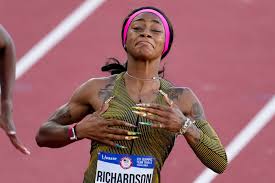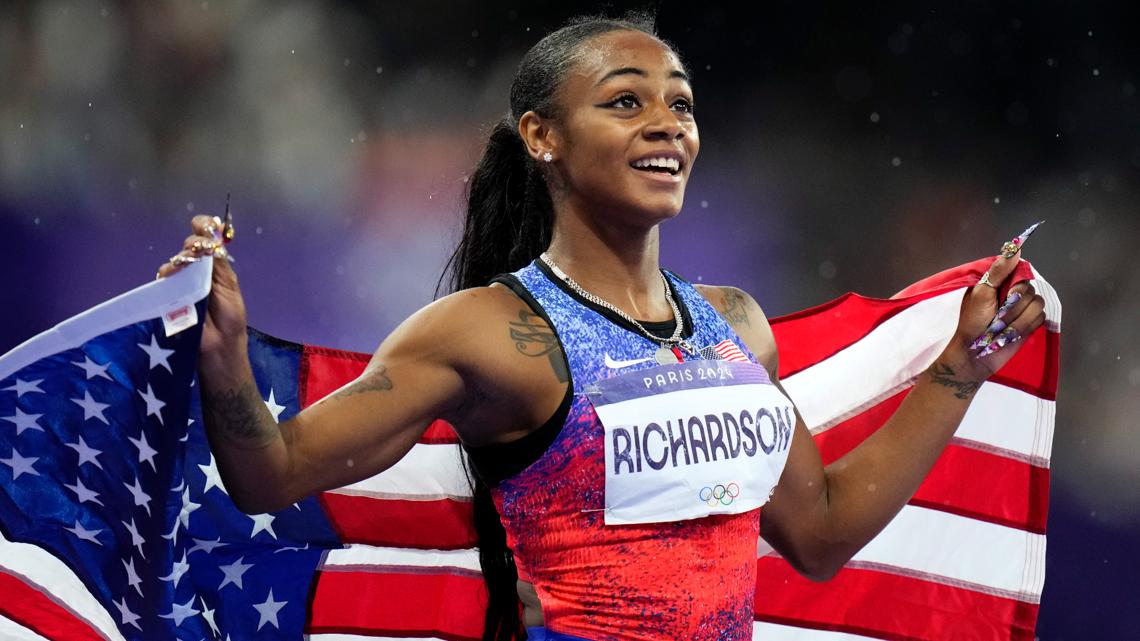Olympic champion Sha’Carri Richardson usually makes headlines because of her lightning speed. But this week the headlines weren’t for breaking records or winning medals — they were about her arrest last month at Seattle-Tacoma International Airport for allegedly assaulting her romantic partner, fellow U.S. sprinter Christian Coleman.
Bodycam footage released Monday shows an incredulous Richardson asking, “I’m under arrest right now? What am I under arrest for?”
However, in the video, Richardson is seen repeatedly shoving Coleman, and then appears to throw a pair of headphones at him.
Although Richardson has apologized and Coleman has declined to press charges, the incident has sparked a wider conversation that often goes unheard: Black men as victims of intimate partner violence.
Stigma Encourages Silence
In heterosexual relationships, women are much more likely to experience intimate partner violence. The most recent data from the Centers for Disease Control and Prevention shows that about 41% of all women and 26% of men reported experiencing intimate-partner violence or assault during their lifetime.
But in the Black community, 45% of Black women report being harmed, a rate just slightly higher than the staggering 40% of Black men who report domestic violence, including physical and sexual assault from their partners.
Experts say structural racism, stigma, and mistrust of the legal system mean many men stay silent. And even when incidents make headlines, victims rarely press charges.
Dr. D. Ivan Young, a behavioral neuroscience and relationship expert, says there’s “stigma in our community that a man should ‘tough it out’ rather than admit he’s been harmed.”
It’s so rare for Black men to press charges in cases of IPV, he says, that women tend to be surprised that pushing, shoving, and stalking can get them into legal trouble.
Erik Larson, a psychiatric mental health nurse practitioner, says there are other factors that contribute to the silence of Black male victims, including “fear of not being listened to or getting meaningful help.”
Among Black men, there’s “an internalized sense of rigid masculinity that causes many men to hide vulnerability,” he says. “Because coming forward as a victim is perceived as a loss of status.”
An Unjust System
That dynamic seemed to play out in the incident involving Richardson and Coleman: according to the Associated Press, the police report noted that “Coleman did not want to participate any further in the investigation and declined to be a victim.”
Young, the relationship expert, says that, historically, “Black men have been hyper-criminalized, so stepping into a legal process against a Black woman can feel like contributing to the same system that has harmed both of them.”
Larson agrees that Coleman’s reluctance to press charges “may also be due to mistrust of the police and legal system due to a wider experience of discrimination and harassment, which makes the risks of reporting seem higher than the potential benefits.”
Coleman seemed to confirm it in an interview with The Athletic.
Richardson “is a human being, and a great person. She has a lot of things going on, a lot of emotions and forces going on inside of her that not only I can’t understand, but nobody can,” Coleman said. “I feel like it was just a sucky situation all around, I don’t feel as if she should have been arrested.”
Young says Coleman’s response isn’t unusual.
“When a Black man chooses not to press charges in a domestic violence situation, it’s often less about excusing the behavior and more about navigating layers of cultural, relational, and systemic complexity,” he says.
Healing Opportunity
Richardson made her first public comments on the matter earlier this week on Instagram.
There’s “definitely a lot of self-reflection, a lot of understanding of not only putting myself in a compromising situation with somebody that I have a deep care and appreciation for as well, is something that — holding myself accountable,” she said.
“I apologize to Christian. He came into my life and gave me more than a relationship, but a greater understanding of unconditional love from what I’ve experienced in my past,” Richardson said. “Due to my past trauma and pain, I was blind and blocked off to not only receive it but give it. I love him, and to him I can’t apologize enough.”
Though the situation seems painful, Dr. Young believes there is an opportunity for healing between Richardson and Coleman.
“What I see here is a deeply human moment: two people under immense personal and public pressure, both needing support and accountability,” he says. “It’s an opportunity for them to address the underlying emotional and relational triggers, and for us as a community to broaden the conversation.”
For Richardson and Coleman, the road forward may be private. But for the rest of us, Young says this is a moment to rethink the way we talk about abuse, masculinity, and care in the Black community.
“We must create safe, stigma-free spaces for Black men to acknowledge victimization without losing dignity, and for Black women to seek help without being defined by their worst moment,” he says. Healing here isn’t just personal — it’s cultural, and when done right, it models growth for everyone watching.”

